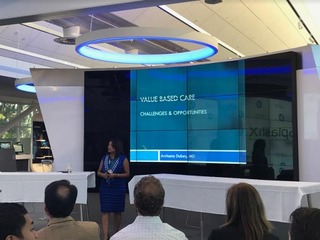Using generative AI for health plan claims, Alaffia Health raises $10M
Amish Jani, Founder and Partner at FirstMark, joined the company's Board of Directors
Read more...
A combination of skyrocketing healthcare costs, along with lackluster results, had led to an increasing shift towards value-based care, which basically means that caregivers are paid on the basis of quality, rather than just for providing their service. Obviously this is a much different kind of healthcare model than most doctors and payers in the U.S. are used to, but it is proving to be an effective one, with reports of people saving an average of 5.6 on the healthcare costs, along with improved care.
As with any kind of shift of this kind, there are going to be issues along the way that have to be ironed out before it can be fully implemented. One of those problems has to do with a lack of collaboration between payers and providers, and that's problem being solved by healthtech company Vim.
"The current healthcare system is inefficient, with accessible, affordable, care out of reach for many patients. To solve this, we’re seeing an industry-wide shift toward value-based care," Oron Afek, co-founder and CEO of Vim, told me.
"In order for this shift to be truly successful, payers and providers have to overcome significant challenges in working together. Today they are operating with limited data sharing, administrative complexities, and a high cost of collaboration. Vim is on a mission to remove those unnecessary hurdles by building a multi-payer platform that aligns their incentives and provides stakeholders with timely, contextual information to help drive value-based decisions."
On Monday, the company announced that it raised a $24 million Series B financing round led by Optum Ventures, with participation from Premera Blue Cross and previous investors Great Point Ventures and Sequoia Capital. With this latest funding, the company has now raised more than $37 million in venture funding.
Founded in 2015 by Afek, Asaf David and Yael Peled, Vim, which is headquartered in San Francisco with an office in Tel Aviv, has works with two sides of the market: payers, such as insurance companies, and provider groups, including primary care doctors and specialists.
"Our customer use case is consistent across the board: we partner with payer groups to help them create value-based care programs that are more accessible to providers. And in turn, we partner with those provider groups to ensure they have access to the data, technology and rewards they need to be successful in making value-based care decisions for their patients," Afek explained.
Part of Vim's thesis is that human intelligence is still an important factor in decision making, even as artificial intelligence is having a major impact on the healthcare industry.
"While Vim uses collective intelligence from healthcare data, it is also still hugely dependent on human expertise to guide both providers and patients towards doctors that deliver value-based care, ultimately delivering cost savings. AI will not replace human doctors, but it will force everyone in the healthcare system to think differently to find better solutions to problems," he said.
The platform currently has access to 10,000,000 patients and 150,000 providers through major health plan partners in the U.S. Part of Vim's value to its customers is the ability to help lower their costs.
"U.S. health care spending increased 3.9 percent to reach $3.5 trillion, or $10,739 per person in 2017, according to the Center for Medicare and Medicaid Services (CMS). By aligning incentives between payers, providers and patients, unnecessary spending can be reduced, and the real ROI to patients--being matched to the right physician within their health plan to get the right treatments so they can get back to living healthier lives-- can be achieved," Afek told me.
"Our platform is designed to integrate with the existing provider and patient-facing experiences, helping payers and providers collaborate by creating a virtual network of top providers, guiding patients and physicians to those top providers through online booking and referral solutions and enabling provider organizations to view their performance and provide feedback to their team that can help them achieve their goals."
Vim, which is currently working with partners in Washington, Alaska, California, Florida and Texas, will use the funding, in part, to continue to expand across the United States. It will also go toward continued product development and expanding its team.
The ultimate goal with Vim, Afek said, "is to reduce the unwarranted variation in healthcare to a range that will be in par with other, OECD healthcare systems."
"Vim is ultimately focused on improving the patient experience-- simplifying the process of finding a doctor who meets the patient’s personalized needs so they can ultimately live healthier lives. To do this, we created a platform that incentives both providers and payers to work together to give them access to the right data and technology to empower value-based care decisions. By having buy-ins from providers and payers together, we can solve major inefficiencies in the current healthcare system," he explained.
"Vim is a 'mission first' company and our team members work smart and hard to drive this necessary change in the current system. If you’re passionate about solving big problems in healthcare while working hard with a multi disciplined team - Vim is the place for you."
(Image source: getvim.com)
Amish Jani, Founder and Partner at FirstMark, joined the company's Board of Directors
Read more...The report outlined four areas as a guide to help startups to sell into these systems
Read more...Flyte delivers mechanotherapy transvaginally to the pelvic floor
Read more...







